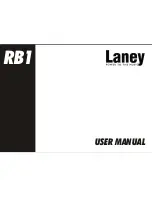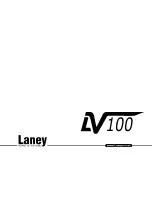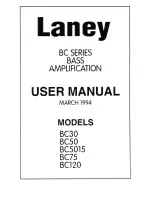
10
9
English
English
Front Panel
1. Input
Plug your guitar in here. Always use a good quality screened guitar lead.
Channel 1
2. Volume
This controls the volume of Channel 1. Turning it clockwise increases the volume. At
low channel volume the amplifier will be completely clean. Increasing the amount of
volume will see the amplifier start to break up into a natural mild overdrive response.
3. Tone
The Tone control allows adjustment of the balance between treble and bass
frequencies within the sound. At low settings (counter clockwise) the sound will be
warmer and darker in character. As the Tone control is rotated clockwise the sound
will become brighter.
4. Channel Indicator
When the RED LED is on Channel 2 is selected. When the LED is off Channel 1 is in
operation.
5. Channel Select
Press this switch to select the Channel.
NOTE:
this switch must be ‘in’ for the footswitch to work.
Channel 2
6. Gain
Channel 2 can be adjusted between a clean and medium overdrive response by
adjusting the Gain control. Low settings (counter clockwise) will deliver a clean sound.
As the Gain control is increased clockwise the sound will be more harmonically rich
until a classic overdrive response is achieved.
7. Bass
The Bass control adjusts the amount of low-end frequencies in your tone. This amp
has an advanced tone shaping circuit which allows the tone to be varied from tight
and cutting when counter clockwise, to warm and thumping when fully clockwise.
8. Middle
The Middle control adjusts the amount of middle frequencies in your tone. The middle
frequencies are particularly important in setting the amount of ‘body’ your tone has.
With the Middle control set to its minimum position (fully counter clockwise) the highs
and lows will be accentuated, and the tone will sound more ‘scooped’. As the Middle
control is increased (clockwise) the amount of ‘body’ is increased, which will lead to a
fatter more vocal mid-range sound.
9. Treble
The Treble control allows exact adjustment of the treble frequencies within the sound.
At low settings (counter clockwise) the sound will be warm and darker in character.
As the Treble control is increased (clockwise) the sound will become brighter. At the
maximum setting the sound will be glassy and very dynamic sounding.
10. ISF (Infinite Shape Feature)
The patented ISF control works in conjunction with
the Bass, Middle and Treble controls. It allows you
to choose the exact tonal signature you prefer. Fully
counter clockwise has a more American characteristic
with a tight bottom-end and accentuated presence
and treble. Fully clockwise has a British characteristic
adding more low-mid body and has a softer more
‘woody’ sound.
Unlike conventional ‘contour’ controls and parametric equalisation systems, the Bass,
Middle and Treble controls remain interactive with each other just like in a traditional
guitar amplifier tone stack. This leads to a very familiar, musical response.
11. Reverb
The Reverb control sets the overall level of the reverb effect. With the control fully
counter clockwise there will be no reverb. Turning the control clockwise will increase
the amount of reverb.
12. Master Volume
This controls the overall volume of your amplifier. Turning it clockwise increases the
volume.
13. Power Indicator Light
The power indicator will light when the amplifier is switched on.
14. Standby
This switch enables the output stage. Always turn this switch on at least 30 seconds
after the Power switch (15). During short breaks in playing use just this switch to
turn ‘off’ and ‘on’ the amplifier’s output.
15. Power
This switch is used to turn the amplifier on and off. You should always turn this
switch on before turning on the Standby switch (14).
USA
UK
Summary of Contents for CV30
Page 20: ...40 39 39 40 Japanese Japanese ...






































